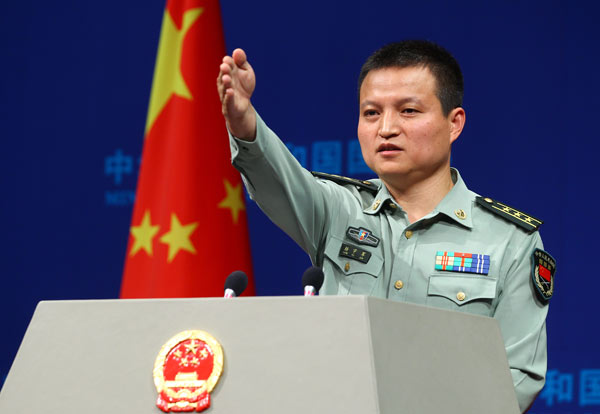Beijing on Thursday dismissed reports that China is building a second aircraft carrier and emphasized its newly commissioned first carrier's defensive nature amid speculation that China will use its increasing maritime strength to resolve territorial issues.
 |
|
China’s Defense Ministry spokesman Yang Yujun answers questions at a regular news conference in Beijing on Thursday. He dismissed media reports saying that China is building a second aircraft carrier in Shanghai and that it will be unveiled by the end of the year. ZOU HONG / CHINA DAILY |
"Such reports are inaccurate," China's Ministry of National Defense spokesman Yang Yujun told a regular news conference. He was responding to a report in the Hong Kong-based newspaper Mingpao that said a second aircraft carrier is under construction on Shanghai's Changxing Island and is expected to be unveiled by the end of the year.
"China will plan the development of aircraft carriers in an all-round way, taking its national economic and social development, as well as the needs of national defense and military construction, into consideration," Yang said.
China's naval power took a landmark leap on Tuesday when its first aircraft carrier, the Liaoning, with the hull number 16, was commissioned in the People's Liberation Army Navy in Dalian.
It makes China the last permanent member of the United Nations Security Council to have an aircraft carrier, and comes as Beijing and Tokyo are locked in the dispute over Diaoyu Islands, which have belonged to China since ancient times.
Most media view the Liaoning as a signal of China's rising power, although it will be used mostly for training and testing for now. Most Japanese media said it has put pressure on Japan amid the territorial tension.
Shigeru Iwasaki, chief of the joint staff of Japan's Self Defense Forces, on Thursday said Japan will continue collecting information and focusing on China's aircraft carrier and military modernization, Kyodo News reported.
When asked about the aircraft carrier's influence on the islands issue, Yang reiterated China's commitment to peaceful, independent and defensive policies, saying China's weaponry was developed to safeguard national security.
But he did not deny reports that on Sept 20 two Chinese frigates were spotted 80 km northwest of the islands, saying it is totally justified and legitimate for Chinese frigates to conduct combat-ready patrols and exercises in its territorial waters.
The Chinese military adheres to combat-ready patrols to handle any maritime emergency and resolutely safeguards the country's territorial sovereignty and maritime rights, Yang said, adding that the military also strengthened cooperation with the departments of fishing and surveillance to guarantee maritime safety.
Yang also urged Tokyo to reflect on its aggressive history during World War II and to gain its neighbors' trust through practical actions, instead of raising regional tensions by emphasizing an agenda related to military security, such as the recent joint drill conducted by Tokyo and Washington on the Western Pacific island of Guam. The drill aimed to strengthen their ability to defend remote islands from a foreign assault.
The debut of the carrier at this critical time reflects Beijing's firm resolution to defend its territories, but owning an aircraft carrier does not mean China will soon resolve the disputes by force, said Li Daguang, a professor at the University of National Defense.
The news has inspired Chinese people and carries a lot of meaning for China, and it has told "the Japanese government it will eventually eat bitter fruit if it makes no effort to correct its mistakes", he said.
Washington has played down the importance of the aircraft carrier, saying after its first sea trial in August 2011 that it had "limited" capability. But the Pentagon also said the vessel was the first step toward a future fleet of carriers expected to be built domestically in the coming years.
The type of aircraft to be deployed on the carrier is key to the Liaoning's combat power, but this information has not been disclosed. The Associated Press said it will take years to build proper aircraft, train pilots to land in adverse weather on a moving deck and develop a proper carrier battle group.
Yang said the carrier-borne aircraft are being independently developed by China, based on homemade aircraft.
Qiao Liang, a professor at the Air Force Command Institute, told Chinese media that the first carrier has brought China closer to its dream of more than 100 years to have a "blue-water navy" — a maritime force capable of operating on the high seas — but the Chinese navy still has a long way to go.
When responding to comments by Manila on Tuesday that Chinese drones may be shot at if they enter the airspace over Huangyan Island, Yang said China's use of drones, or unmanned aerial vehicles, over Huangyan Island, the Nansha Islands and their adjacent waters is "justified and legal", and warned that China opposes any military provocation in the South China Sea.
China has indisputable sovereignty over Huangyan Island, the Nansha Islands and their adjacent waters, he said.
Contact the writers at zhaoshengnan@chinadaily.com.cm.cn and lixiaokun@chinadaily.com.cn
